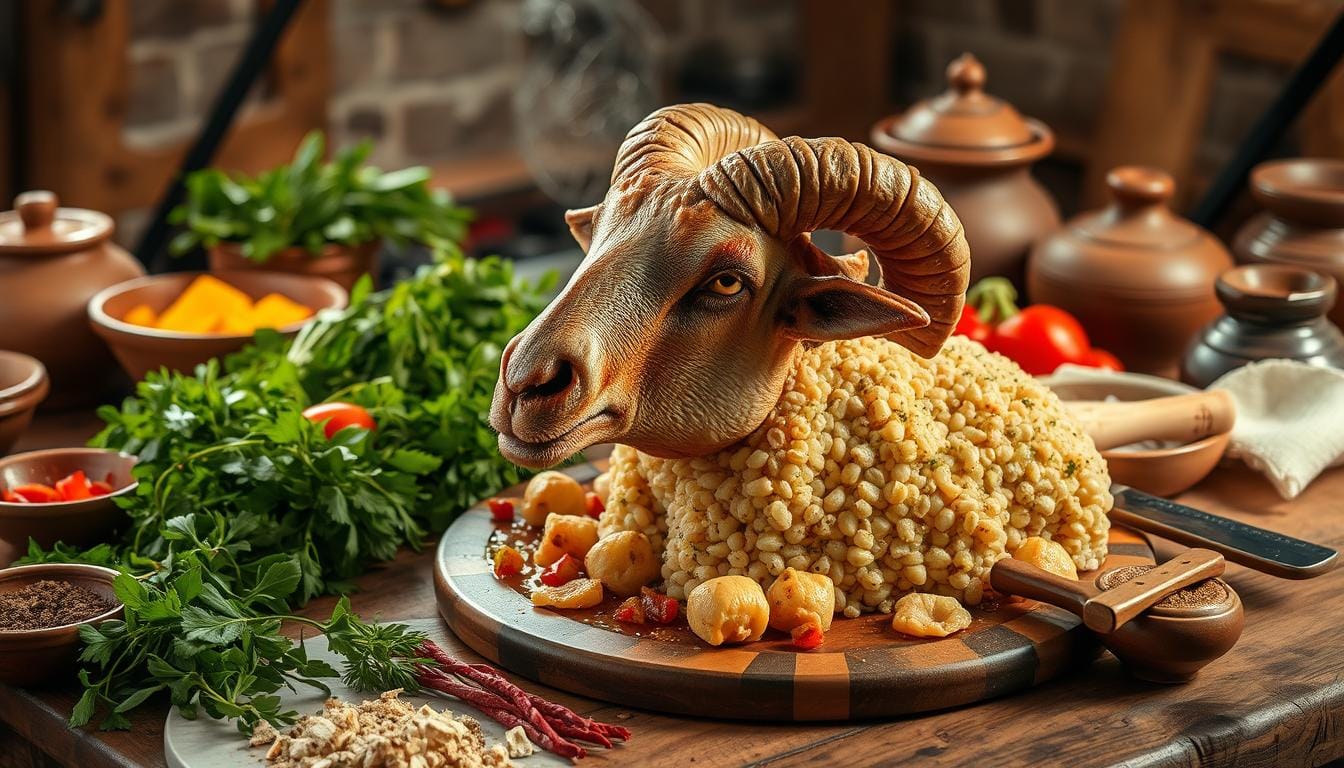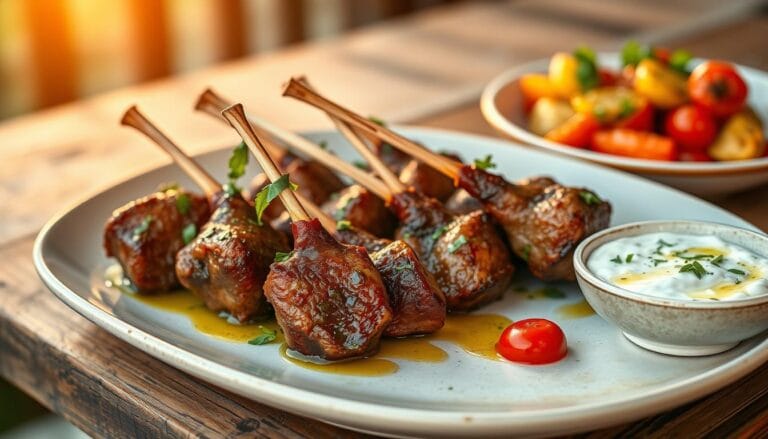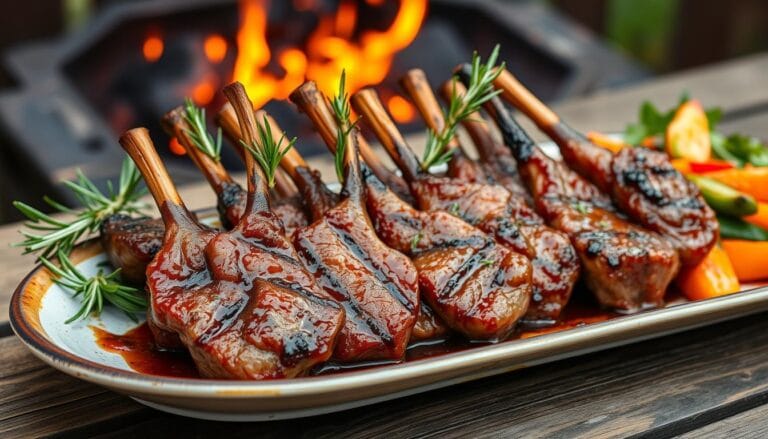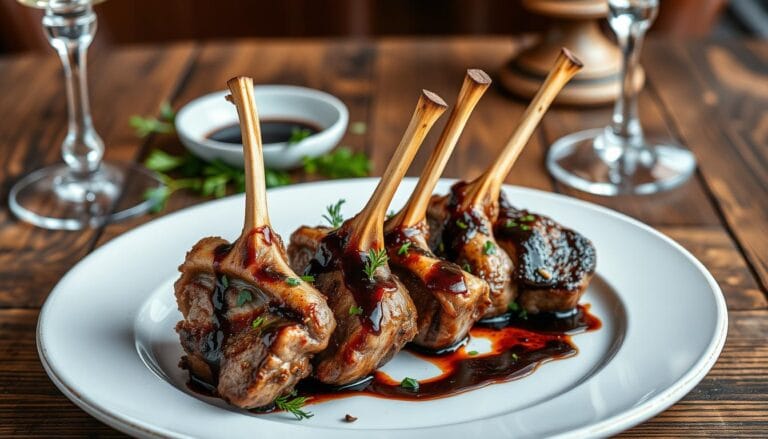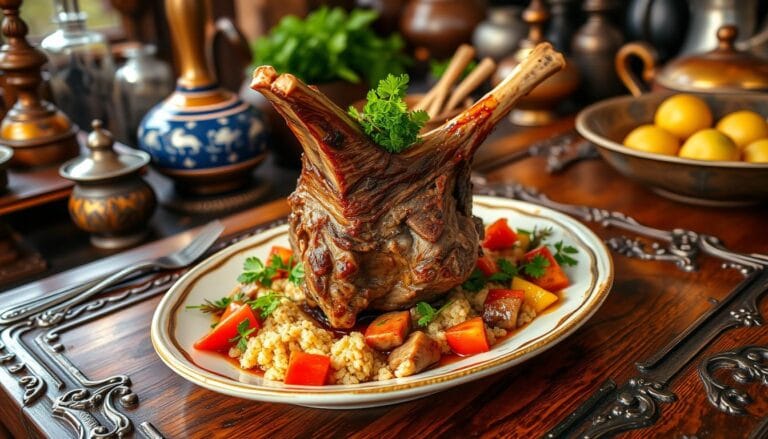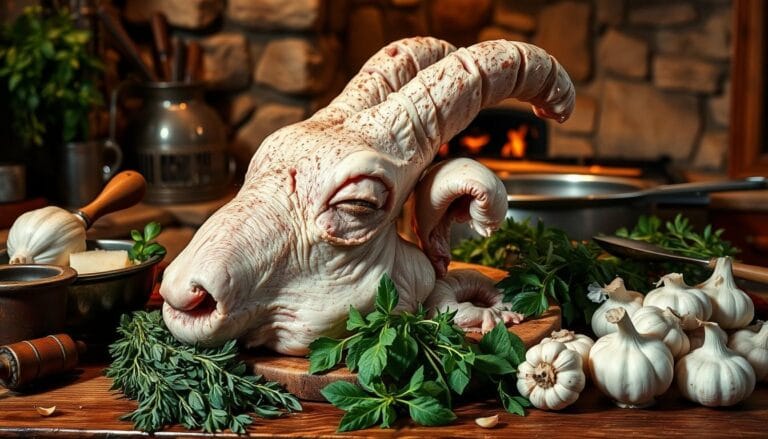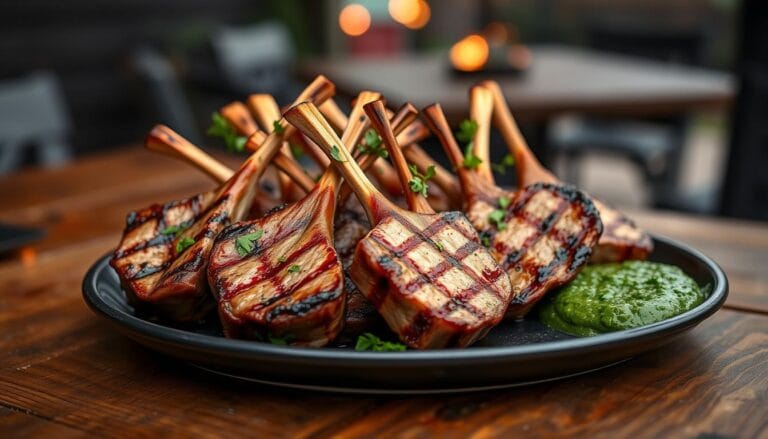Sheep Head Dish: Preparation Tips
Growing up, I was introduced to a traditional sheep head dish. The smell of slow-cooked meat and the stories around the table were unforgettable. It sparked my interest in this unique cooking art.
A sheep head dish is more than a meal. It’s a symbol of culinary heritage and resourceful cooking. Whether you love trying new foods or exploring traditional dishes, learning to prepare a sheep head dish can change your cooking.
This traditional dish is not just about cooking. It’s a journey that connects families through generations. It involves selecting the right ingredients and mastering cooking techniques. Preparing a sheep head dish requires patience, skill, and respect for culinary traditions.
Key Takeaways
- Sheep head dishes represent a unique culinary tradition
- Preparation requires specialized techniques and knowledge
- Cultural significance extends beyond mere cooking
- Ingredients and preparation methods vary by region
- Understanding proper cleaning and cooking techniques is crucial
- Nutritional value can be significant when prepared correctly
What is a Sheep Head Dish?
Exploring sheep head cuisine shows a rich tradition from Viking culture. It’s not just a meal; it’s a symbol of cultural heritage and cooking methods.
A lamb head recipe is more than just cooking meat. It carries centuries of culinary wisdom, especially in areas influenced by Viking cuisine. It uses every part of the sheep, showing a smart way to reduce food waste.
Overview of Sheep Head Cuisine
Sheep head dishes vary but share key traits:
- Usually made with the whole sheep head
- Rich in protein and nutrients
- Cooked in ways like boiling or roasting
“Utilizing every part of the animal is not just a cooking technique, but a profound cultural practice.” – Traditional Food Historian
Cultural Significance of the Dish
In Norway, smalahove is more than food; it’s a cultural icon. It was vital for survival, making sure no part of the animal was wasted. It was especially important in western Norway, like Sogn og Fjordane and Hordaland.
The dish is also nutritious. A sheep head has minerals like iron, zinc, and calcium. It’s full of protein and vitamin B12, good for muscles and the nervous system.
Though it might seem odd to some, sheep head cuisine is a remarkable tradition. It connects communities to their past and shows amazing cooking skills.
Choosing the Right Sheep Head
Choosing the perfect sheep head is key for a true Nordic delicacies experience. Your choice can make or break the dish. So, it’s important to know what to look for.
Key Factors in Selection
When picking a sheep head, consider these important points:
- Freshness: Look for a sheep head with clear eyes and firm meat
- Color: Seek a pinkish-white appearance without discoloration
- Sourcing: Prioritize local farmers and ethical producers
- Size: Select heads appropriate for your specific cooking method
Where to Purchase Quality Sheep Heads
Finding the right sheep head requires smart shopping. Specialty butchers and farmers’ markets are great places to start for your sheep smoker preparations.
| Source | Pros | Considerations |
|---|---|---|
| Local Butcher | Fresh, personalized service | May require pre-ordering |
| Farmers’ Markets | Direct from producer | Seasonal availability |
| Specialty Online Retailers | Wide selection | Shipping costs |
*”Quality ingredients are the foundation of exceptional cuisine.”*
Supporting local producers means fresher ingredients and helps sustainable food systems. Your careful choice will make your Nordic delicacies experience unforgettable.
Preparation Techniques for Sheep Head Dish
Working with a smoked sheep head needs skill and patience. It’s a traditional ingredient that requires careful steps to make it delicious.
Handling a sheep head needs specific skills. Both professional chefs and home cooks must be precise and respectful.
Cleaning the Sheep Head Thoroughly
Cleaning the sheep head is key for a great dish. Here’s how to do it right:
- Remove all visible hair using a small torch or carefully scraping
- Rinse the head multiple times with cold water
- Use a clean brush to scrub away any remaining debris
- Pat dry with clean kitchen towels
“Cleanliness is the first step in creating an exceptional rustic meat preparation.” – Traditional Chef
Cutting and Butchering Tips
Cutting a sheep head needs precision and knowledge. Here are the steps to break it down:
- Use a sharp butcher knife for clean cuts
- Separate the jaw from the skull carefully
- Remove the tongue and cheek meat with surgical precision
- Trim excess fat and connective tissue
When preparing your smoked sheep head, remember that each cut matters. The eyes are considered a delicacy in many culinary traditions, so handle them with extra care.
Keep in mind that rustic meat preparations like this require patience and practice. Your technique will improve with each attempt, transforming a challenging ingredient into a remarkable culinary experience.
Cooking Methods for Sheep Head
Preparing an Icelandic smoked sheep head needs skill and the right cooking techniques. These methods turn this unique ingredient into a tasty dish. Whether you use old ways or new, knowing the best cooking methods makes your sheep head dish better.
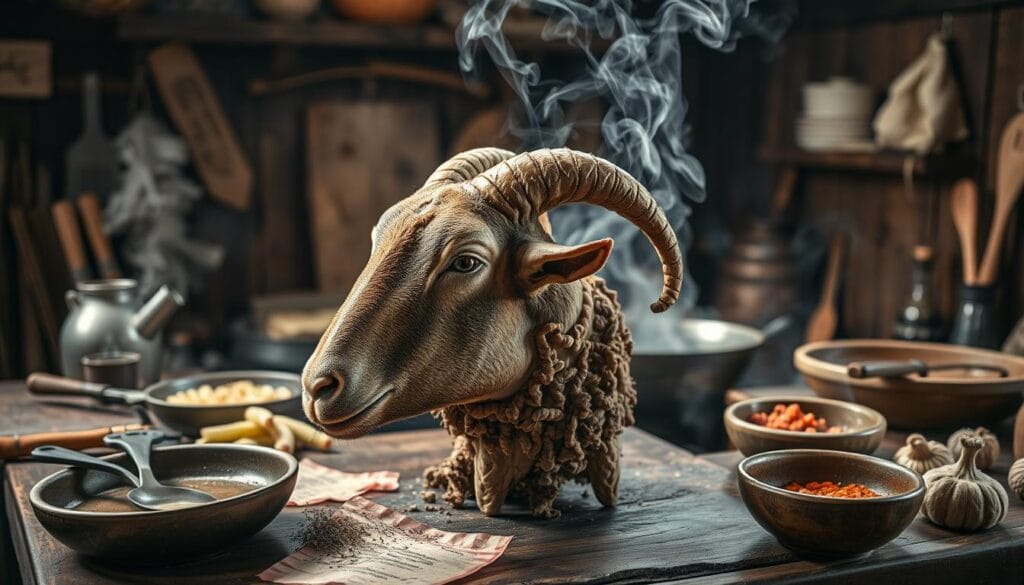
Traditional Roasting Techniques
For generations, people have cooked sheep head the traditional way. The most common method is slow roasting. This makes the meat tender and the flavor rich. Here are some key techniques:
- Slow roasting at low temperatures
- Using open fire or wood-burning ovens
- Seasoning with traditional salt and herbs
Modern Cooking Approaches
Today, there are new ways to cook Icelandic smoked sheep head. One good method is using a Weber kettle 22″ grill. Here’s how to set it up:
| Cooking Method | Temperature | Cooking Time |
|---|---|---|
| Charcoal Grill Smoking | 225-250°F | 3-4 hours |
| Indirect Heat Roasting | 275°F | 2-3 hours |
“The key to perfect sheep head is patience and precise temperature control” – Traditional Icelandic Chef
When using a sheep smoker, place charcoal baskets on either side. This creates indirect heat. It cooks the meat evenly and adds a smoky flavor, just like in Icelandic dishes.
Preparation Tips
- Clean the sheep head thoroughly
- Pat dry with paper towels
- Apply dry rub or marinade
- Maintain consistent cooking temperature
- Let meat rest before serving
Try different cooking methods to find the best way to enjoy your Icelandic smoked sheep head. It will make your meal unforgettable.
Flavor Profiles and Seasoning
Exploring traditional sheep dishes reveals the rich flavors that make them stand out. The unique taste of sheep head cuisine needs careful seasoning. This balances its intense, gamey flavors.
When cooking gamey meat dishes, aim for a blend of flavors that enhance the meat’s richness. Use spices and herbs that cut through the dish’s fatty nature.
Essential Spices and Herbs
- Rosemary – adds earthy notes
- Thyme – provides a subtle, aromatic touch
- Cumin – brings warmth and depth
- Garlic – cuts through the fatty flavor
- Black pepper – adds a sharp contrast
Regional Flavor Variations
Different cultures have unique ways of seasoning, creating distinct flavors for their traditional sheep dishes.
“The art of seasoning is about balance and understanding the meat’s natural characteristics.” – Chef Maria Rodriguez
| Region | Signature Seasoning | Flavor Profile |
|---|---|---|
| Middle Eastern | Baharat Spice Blend | Warm, Complex |
| Nordic | Herbs and Salt | Subtle, Clean |
| Mediterranean | Lemon and Garlic | Bright, Zesty |
When seasoning, always think about the meat’s natural gamey taste. Begin with light seasonings and adjust as needed. This lets the sheep head’s true flavor come through.
Popular Side Dishes to Serve
When you make a traditional sheep head dish from Nordic delicacies, picking the right side dishes is key. The right choices can turn your meal into something truly special. It makes your dining experience unforgettable.
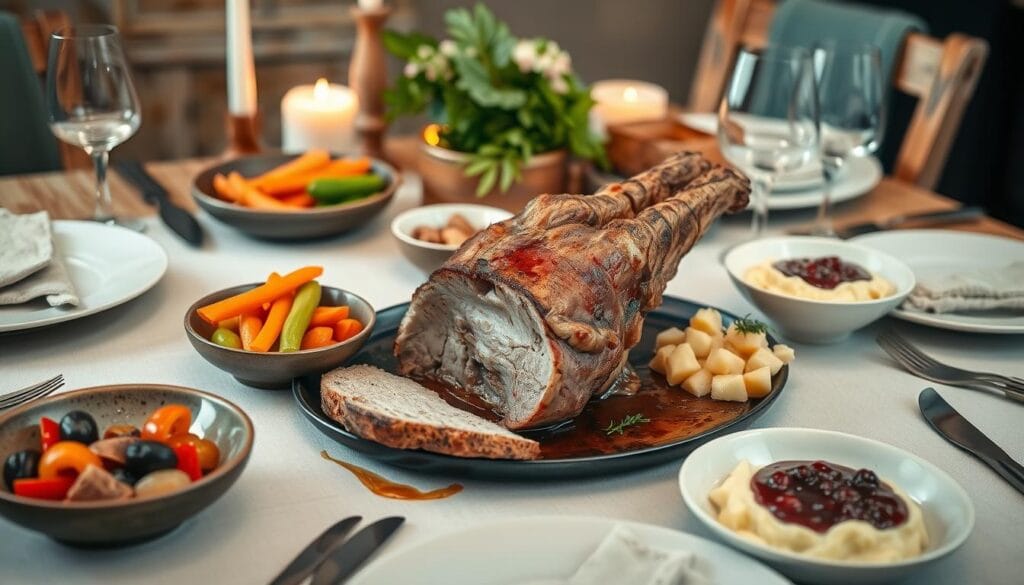
Vegetables are essential in bringing out the rich flavors of sheep head. Here are some top picks:
- Roasted Turnips: Sweet and caramelized, they offer a nice contrast to the savory meat
- Sauerkraut: A traditional Norwegian favorite that adds a tangy twist
- Roasted Root Vegetables: Rutabaga and parsnips add earthy flavors
Recommended Vegetable Pairings
For a true Nordic taste, choose seasonal and local veggies. Try roasted carrots with honey or asparagus with pine nuts. They can make your sheep head dish a gourmet delight.
Grains and Breads
Pair your main dish with hearty grains and traditional breads:
- Farro Salad: A solid, make-ahead grain choice
- Rye Bread: A classic Nordic side
- Potato-based Side Dishes: Creamy polenta or crispy potato roses
“In Viking cuisine, side dishes are not mere additions but integral components of the dining experience.” – Nordic Culinary Historian
Your side dishes should mix texture, flavor, and nutrition well. Try different mixes to find your ideal meal.
Serving Suggestions
When you serve a rustic meat dish like a traditional sheep dish, pay close attention to detail. The way you present it can turn a simple meal into a memorable experience.
Presentation Tips for Authentic Flavor
Here are some key tips for presenting your sheep head dish:
- Use earthenware or wooden platters to enhance the rustic look
- Garnish with fresh herbs like parsley or cilantro
- Include lemon wedges for a bright, acidic touch
- Serve family-style for a traditional communal dining experience
Ideal Serving Temperatures
Temperature is key to bringing out the best flavor in your traditional sheep dish. Here’s a quick guide to the best serving temperatures:
| Dish Type | Ideal Temperature | Serving Recommendation |
|---|---|---|
| Roasted Sheep Head | 140-145°F | Serve immediately after resting |
| Braised Preparation | 150-155°F | Keep warm before serving |
| Grilled Sheep Head | 135-140°F | Serve with fresh accompaniments |
Pro tip: Always let your rustic meat preparation rest for 10-15 minutes before serving. This ensures maximum tenderness and flavor distribution.
“The art of serving is as important as the cooking itself” – Traditional Chef Wisdom
Nutritional Benefits of Sheep Head
Exploring gamey meat dishes, we find the sheep head is a nutritional powerhouse. It’s packed with essential nutrients. Nordic delicacies like this traditional dish offer more than just unique flavor – they bring remarkable health benefits to your plate.
Sheep head meat provides an impressive nutritional profile that supports overall health and wellness. The protein content is particularly noteworthy. It makes it an excellent choice for muscle development and energy production.
Protein and Health Benefits
Your body receives significant nutritional advantages from consuming sheep head:
- High-quality protein supporting muscle growth
- Rich collagen content for skin and joint health
- Immune system strengthening properties
Essential Vitamins and Minerals
The nutrient density of sheep head is remarkable. Check out these key minerals:
| Mineral | Health Benefit |
|---|---|
| Calcium | Bone health support |
| Iron | Blood oxygen transportation |
| Vitamin B12 | Nervous system maintenance |
| Zinc | Immune function enhancement |
“Nutrition isn’t about perfection, it’s about balance and understanding the unique benefits of traditional foods.” – Traditional Culinary Expert
Nordic delicacies like sheep head demonstrate that traditional foods can be both delicious and incredibly nutritious.
Cultural Variations of Sheep Head Dish
Exploring lamb head recipes around the world is a journey through different culinary traditions. Each culture has its own way of preparing sheep head, showing unique approaches to this traditional dish.
Every region adds its own flavor and technique to cooking sheep head. This turns a simple ingredient into a rich cultural experience.
Middle Eastern Interpretations
In the Middle East, lamb head is celebrated in dishes like Turkish Kelle Paça. This dish is more than food; it’s a way to bring communities together.
- Typically prepared during special gatherings
- Simmered for several hours to develop complex flavors
- Considered a nourishing comfort food
Latin American Versions
Latin American cultures are creative with their sheep head dishes. They show great respect for cooking the whole animal.
“Cooking is about tradition, culture, and connecting with our roots” – Unknown Chef
| Region | Unique Preparation | Key Characteristics |
|---|---|---|
| Argentina | Slow-roasted with chimichurri | Robust, spicy flavors |
| Peru | Marinated in citrus and herbs | Light, refreshing preparation |
Exploring Middle Eastern or Latin American cuisine through lamb head recipes opens a window to rich traditions and culinary innovation.
Common Mistakes to Avoid
Preparing smoked sheep head needs care and focus. Many home cooks face issues that can ruin this traditional dish.
Preparation Pitfalls to Watch
Knowing common mistakes helps make a tasty smoked sheep head. Here are key errors to steer clear of:
- Insufficient cleaning of the sheep head
- Neglecting proper seasoning techniques
- Overlooking temperature control during cooking
- Rushing the preparation process
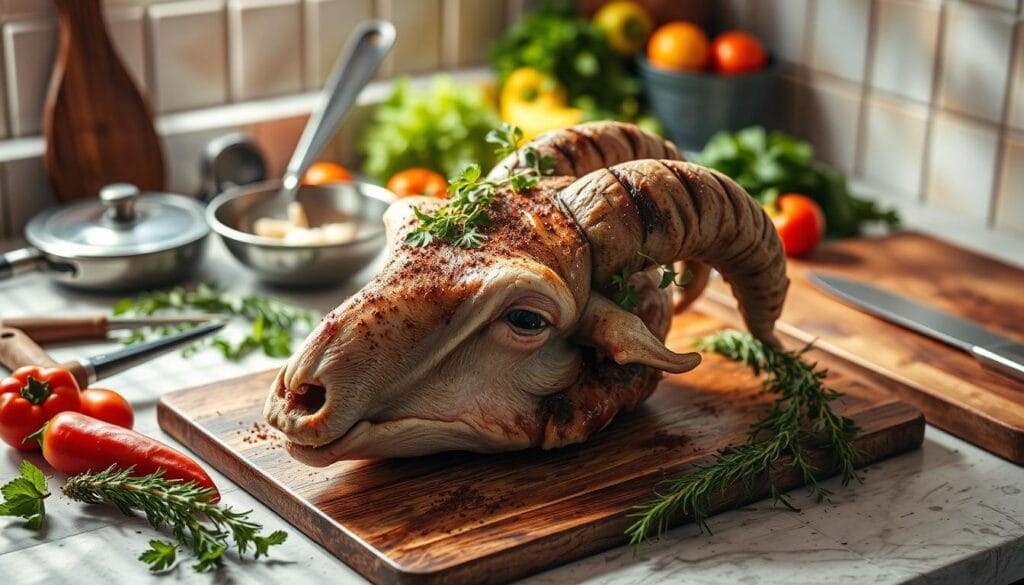
Critical Cooking Errors
Avoiding these cooking mistakes is crucial for a successful dish:
| Cooking Error | Potential Consequence | Solution |
|---|---|---|
| Overcooking | Tough, dry meat | Monitor cooking time (2-4 hours) |
| Undercooking | Food safety risks | Use meat thermometer |
| Improper seasoning | Bland flavor | Use recommended spices |
“Patience and attention to detail are the secret ingredients in preparing an exceptional smoked sheep head.” – Culinary Experts
Pro tip: Let the meat sit for 30 minutes after seasoning. Cook at 300°F for best results. Cooking times can be 2-4 hours, depending on your method.
Key Preparation Recommendations
- Clean the sheep head thoroughly
- Season generously with 5 essential herbs: thyme, rosemary, garlic, cumin, and coriander
- Ensure adequate liquid during cooking
- Let meat rest after cooking
By avoiding these mistakes, your smoked sheep head will be a standout dish.
Conclusion and Final Thoughts
Your journey into cooking with sheep head is more than just a recipe. It connects you to Viking cuisine’s rich history. It shows the value of using every part of the animal, promoting sustainable eating.
Learning about sheep head dish opens up a world of cultural traditions. It’s a chance to dive into Viking cuisine and try new cooking methods. This unique dish lets you explore historical food ways that go beyond just eating.
Embracing Traditional Cooking Techniques
Mastering the sheep head dish is more than following a recipe. It’s about keeping a culinary tradition alive. Every time you cook it, you honor old cooking methods while making them your own.
This dish is a link between old and new in food culture. It turns an often-overlooked ingredient into a special meal. It celebrates both the history of cooking and the creativity of modern chefs.
FAQ
What exactly is a sheep head dish?
A sheep head dish is a traditional meal made from a whole sheep’s head. It’s often roasted, boiled, or smoked. This dish is popular in Nordic countries like Iceland and Norway. It shows how to use the whole animal and reduce food waste.
Is eating a sheep head safe?
Yes, sheep head is safe to eat if it’s cooked right. Make sure it’s boiled or roasted well to kill bacteria. This ensures it’s both safe and nutritious.
Where can I find a sheep head for cooking?
You can find sheep heads at specialty butchers, farmers’ markets, and ethnic stores. Some online meat suppliers also carry them. Always buy from a trusted source that follows food safety rules.
What does sheep head taste like?
Sheep head tastes rich and gamey, with a bit of fat. When cooked right, it’s tender. The different parts of the head have different textures, from soft cheek meat to gelatinous areas.
How do I prepare a sheep head for cooking?
First, clean the head well and remove unwanted parts. Then, sanitize it. Traditionally, it’s salted to preserve and flavor the meat. You’ll need to remove hair, clean the teeth, and make sure the outside is clean.
Are there different cultural variations of sheep head dishes?
Yes, there are many versions of sheep head dishes around the world. In Iceland and Norway, it’s called Smalahove. In the Middle East and Latin America, it’s a special treat. Each place has its own way of cooking and seasoning it.
What are the nutritional benefits of eating sheep head?
Sheep head is packed with protein, vitamins like B12, and minerals like zinc and iron. It’s a nutritious dish that offers a full protein source and many vitamins and minerals. It’s a great meal for your health.
What are common side dishes served with sheep head?
In Nordic cuisine, side dishes include rutabaga, sauerkraut, potatoes, and bread. These help balance the rich flavor of the sheep head. They make the meal complete and satisfying.
How should I cook a sheep head?
You can boil, roast, or smoke a sheep head. Traditional cooking is slow to make it tender. The temperature is usually between 250-325°F. Smoking adds a special flavor.
What are some common mistakes to avoid when preparing sheep head?
Avoid not cleaning it well, cooking at the wrong temperature, overcooking, and not removing hair. Always prepare it thoroughly and follow food safety rules.
Source Links
- https://www.hamisharafi.com/free-recipes/kaleh-pacheh – Kaleh Pacheh Recipe — I got it from my Maman
- https://anycreek.com/academy/sheepshead-recipe-two-ways – Two Most Delicious Sheepshead Recipes | moist, succulent, tender, delicious, fried, and healthy (Updated Mar 2024)
- https://www.chefturko.com/sheeps-head-terrine-turkish-sogus/ – Sheep’s head terrine – Turkish Söğüş – ChefTurko
- https://www.foodlorecentral.com/strange-eats/sheeps-head/ – Smalahove: Norwegian Sheep’s Head Delicacy | Traditional Cuisine Guide
- https://www.countryfile.com/christmas/christmas-world-foods – Narwhal skin, sheep’s head, fermented fish – 10 curious Christmas dishes from around the world
- https://www.turkishrestaurant.ae/turkish-style-sheeps-head-and-foot-soup-in-dubai/ – Turkish style sheep’s head and foot soup in Dubai
- https://www.meatsaucerecipes.com/sheepshead-fish-recipe-2/ – Delicious Sheepshead Fish Recipe 2024. – meatsaucerecipes
- https://www.tastymeatrecipes.net/best-lamb-head-recipe-ever/ – Best Lamb Head Recipe Ever – Traditional Middle East Dish
- https://www.delish.com/holiday-recipes/easter/g42642114/side-dishes-for-lamb/ – 40 Side Dishes That Turn Your Lamb Into A Holiday-Worthy Feast
- https://rosannaetc.com/post/easter-side-dishes/ – Top 20 Best Easter Side Dishes For Lamb
- https://www.bdoutdoors.com/recipes/chipotle-sheepshead-ceviche-with-coronado-blonde-ale-recipe/ – Chipotle Sheepshead Ceviche with Coronado Blonde Ale Recipe | BDOutdoors
- https://www.dimitrasdishes.com/greek-lamb-cabbage-stew/ – Greek Lamb & Cabbage Stew
- https://chefreza.ca/the-health-benefits-of-breakfast/ – The Health Benefits of Breakfast
- https://www.tritiprecipes.com/best-lamb-head-recipe-ever/ – 5 Steps to the Best Lamb Head Recipe Ever – Easy Guide
- https://broganabroad.com/food-in-iceland/ – Food In Iceland: Amazing Dishes You Must Try (And What To Avoid!)
- https://www.houseonthesheepshead.com/sheep-s-head-fishing-blog/ – Sheep’s Head Fishing Blog
- https://jamieschler.substack.com/p/navarin-dagneau – Navarin d’Agneau
- https://www.tartmagazine.net/journal/no-penne – No Penne
- https://www.travelsforstars.com/blog/2024/06/25/alchemist-copenhagen – Review: Alchemist – Copenhagen

